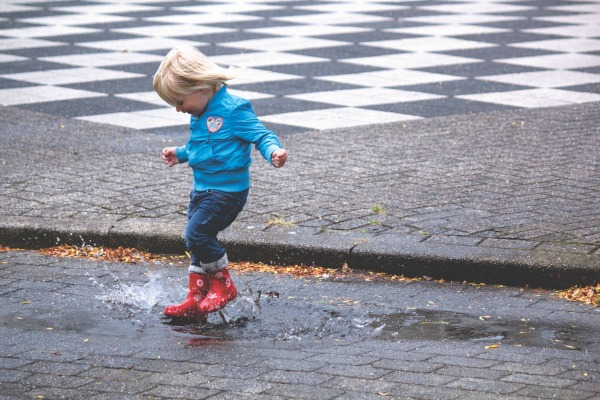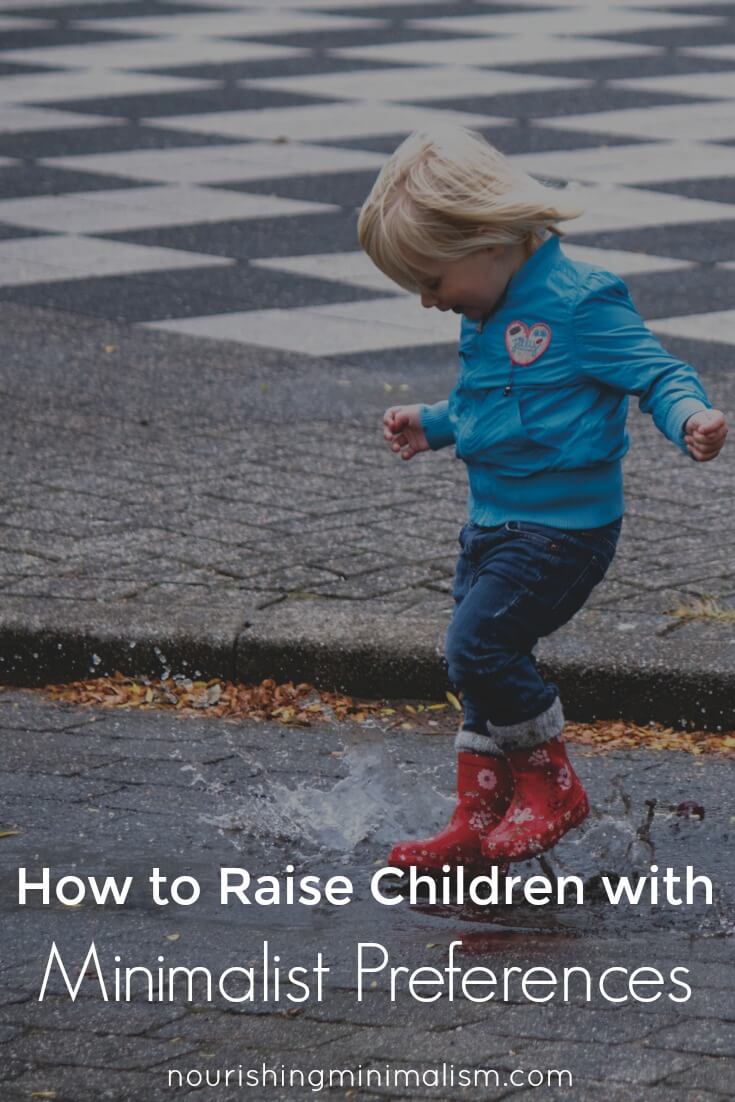How to Raise Children with Minimalist Preferences

Before we get into the how-to part of this post, I would like to issue a disclaimer:
You can do all you can to influence a person (child), and in the end, there is no guarantee what their preferences will be, how organized they’ll be or if they will care even one iota about the state of their surroundings. (At least, enough to take their own action to change it.)
Situations in our life will affect us and mold us to an extent, and an extreme can lead to severe habits to try to compensate the other extreme. So as you walk through this life with your children, keep a balanced perspective: be flexible on the number of items they own, don’t freak out when they bring dollar store crap home from a birthday party and don’t force them to hang onto things because you see the sentimental value to it.
Start young
Obviously, if you started on your simplified journey after you were already in the throes of raising children, this step is impossible. But if you have a baby or toddler, you can begin teaching them now.
Talk about things
I can’t stress this enough. Personally, I had to learn to talk to my children. Not that I didn’t speak to them, but I didn’t talk to them in a way to help them understand things that we were doing or going to do. I would talk to them about school and listen to their stories but I neglected to tell them that I had been planning all week: “Saturday we’re going to declutter the toys,” and I never mentioned it until I was grabbing a garbage bag and heading towards their bedroom.
Talking is essential to decluttering because there is an emotional process that we have to go through as we get rid of things. It’s important for children to understand what is normal, that feelings are o.k., and the importance of acknowledging and working through those feelings.
Their space needs to be their space
Don’t go through stuff while they are away, don’t toss the junky toys and papers without asking permission. Let them feel like they have the say of what stays and what goes in their space. If you get rid of things while they are gone, they will begin to hide things and fear your decluttering, which will turn them more to hoarding tendencies: remember, we’re aiming for balance.
As you help them think through what they should keep and what they should discard, avoid pressuring them to keep certain sentimental things. As adults, getting rid of gifts is very difficult, but if the child is willing to do that, don’t impose any guilt or shame on them, just bite your tongue and let them get rid of the item.
Involve them in the process
This goes right along with the previous 2 points- talk to your children, and let them have a say. Talk about the organizations you donate to, what do they provide for the community? Who do they help? Talk to your child about how the things they give away provide homes/food/clothing for people that are struggling.
Talk to them about how they feel when their room is clean and clear of clutter. When emotions come up, acknowledge them.
It’s ok to feel sad that their favorite shirt is too small. Ask if the child wants you to take a picture of it so they can remember.
It’s ok if they don’t like an outfit that grandma gave them, grandma wanted to express her love, and they showed appreciation at the time, so they have the freedom to give it away.
It’s ok to get rid of an unfinished project if they took up knitting and got through 4 inches of a scarf before acknowledging that it frustrated them, there is no need to keep it and feel guilty for not finishing it.
Give them permission to let things go.
Make organizing fun
Give each item a home. You can use labels and mark places out on a shelf like those table setting placemats that showed the designated spot for the plate, fork, knife & spoon.
Have shelves, bins, and hooks for the things they need. Talk about their habits and how organizing should flow with them. If they come in the bedroom door and drop their backpack, place a hook on the wall near the door so they can just put it on the hook.
If they have their legos set up on the window sill, have a shelf with a lego bin near the window, so it’s easy for them to get things out and put them away.
Lead by example
The more changes they see you make, the cleaner and calmer your home becomes, the more it will inspire those living with you to participate.
For example, you can’t expect them to make their bed and put their clothes away every day if you never make your bed and your clothes are all over the floor and dresser in your bedroom.
Let them see you putting in the effort with your own things- the areas of the house where you are the only one that it matters to. Show them how many items you got rid of, show them how you gave the remaining things a home, let them see your bed is made and the clothes are put away.
Related articles:
- Why Your Children Need To Learn To Declutter
- How To Get The Kids On Board With Decluttering The Toys
- How to Encourage Kids to Clean and Declutter their Spaces


I love this! Especially about not throwing away toys while kids are away. It’s so tempting, especially as you’re starting your minimalist journey and are so overwhelmed by stuff as a parent you want to get rid of it all.
I have one particularly sentimental child, but she is learning how to declutter, too. It’s possible! Even if they’re creative and love to collect things. I don’t understand being sentimental, but I love my daughter and am learning to honor our differences.
Thanks again for sharing!
Thank you for this! It is so encouraging and inspiring. We have just had to get rid of everything porous because of mold and so now we are minimalists! It’s exciting mostly, but I have a 3 year old who misses our old apartment. Also, because her dad hasn’t been in this new place very much at all for a month and a half since we moved, so that is hard. I haven’t had a chance to get her a new bed or anything much so our house is quite empty. I am praying we will settle in and she will like her room once I can purchase replacements. I tend to let her get a little toy here and there at stores because I think she will like it, but I have noticed she doesn’t even play with the new things much. I have most of her things put in a closet because she has acted so ungrateful. I’m not sure if it’s even in her mind that her things are gone or put away or that she doesn’t have all that much anymore. Do you have any thoughts? Maybe her acting ungrateful for new things is normal? I gave her a new princess dress and crown and asked if she felt pretty and she like shut down. Maybe that was something different than being ungrateful. I don’t want to make her have hoarding issues or anything so I really appreciate your post!
Thanks Natalie! I’m not sure… Maybe she’s not a “gift” person? Have you read 5 Love Languages? I think they have one for kids, which might help- but some people appreciate words of affirmations or having someone do something for them or spend time with them instead of enjoying gifts. For the ones who don’t enjoy gifts, it really means very little to them, but if you sit and play a game, they may swell with appreciation.
I would try different activities and pay attention to her response- read books, color, go for a walk, go out to ice cream (or something special) sit together and talk, tell her how much she means to you and how much you enjoy her being with you, have her help you do the dishes or cook something, help her make her bed in the morning and talk about how you want it to look pretty for her. As you watch her response, it will give you a better idea of what she needs to feel loved. Just the fact that you noticed her response so far is good- you’re a good mom Natalie. ❤️
It sounds like a coping mechanism – what you’re calling ‘ungrateful.’ Maybe there is child counselor that can help. If she is shutting down when receiving a gift, she has learned something about the attachments to those things she has been given. Finding a way to get her to open up now before she gets older will benefit her. 930 plus years of counseling and being a volunteer counselor is why I share this.)
I am definitely a gma with the gift of love language syndrome or perhaps disease is a better term. Someone needs to teach us how to become minimalists in giving so our adult children don’t have to breathe and count to ten when we pull in the driveway.